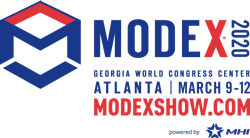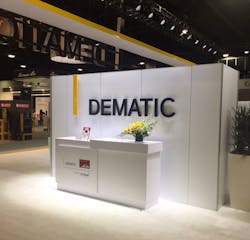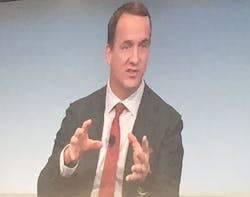MODEX 2020: Supply Chain Show Forges On Despite COVID-19
Timing is everything, as the cliché goes, and while MHI, the industry trade group that sponsors North America’s largest annual gathering of material handling and logistics professionals, might rightly have lamented the greatly diminished crowds at this year’s MODEX 2020 show, at least the show took place. Had it been scheduled just a week or two later, the show might have been indefinitely postponed or canceled entirely, as we’ve seen happen with other big shows planned for the spring.
COVID-19 was already a big deal by March 9, when MODEX 2020 opened its doors at the sprawling Georgia World Congress Center in Atlanta, but it hadn’t yet become THE ONLY DEAL, so airports were still open and many people were still being allowed to travel (though that number would shrink drastically in the coming days). MHI originally was expecting close to 40,000 attendees throughout the week, but fears over the rapid spread of the COVID-19 virus had already prompted some major show organizers to postpone or cancel outright their events. Prominent no-shows included Hannibal Industries, Kardex Remstar, KION Group (and its Dematic and Linde divisions), Panasonic, Rite-Hite, SICK, Wildeck and Zebra. Though most would end up sending representatives to the show, their empty booths had the eerie feeling of a ghost town.
According to George Prest, MHI’s CEO, total attendance ended up around 16,500, down nearly 50% from their pre-registered numbers, while just under 900 exhibitors came to the show, which was about 10% off original projections of nearly 1,000. MHI has announced tentative plans to create a virtual MODEX event will be available in mid-April.
Preparing for a Cyber-War
Speaking to the COVID-19 crisis, opening day keynote speaker Nikki Haley, former Governor of South Carolina and former U.S. Ambassador to the United Nations, said, “We should all be thinking about having contingency plans about what to do if and when your supply chain shuts down. The more you communicate that plan to your employees, the more reassured they’ll be that everything ultimately will turn out all right.”
Looking beyond the current health situation, Haley opined that long-term, cybersecurity represents the biggest concern for the country because “it’s the cheapest form of warfare. Businesses need to have a cyber-plan in place. If an airport, a railroad or a utility plant shuts down, the impact on your supply chain can be immediate and can compromise your business.”
Speaking to the role of supply chain leaders, she added, “Being a leader isn’t about doing what’s popular. When you see something that’s not working, you need to communicate what needs to be done, and then put those changes in place,” whether that involves technology, processes or people. “You have to be able to say things that might be uncomfortable for some people to hear. Leadership is results—it’s action.”
Where Do You Get Such Great Ideas?
At a press conference, Toyota Material Handling announced this year’s recipients of the Toyota University Research Program grants, a program created to investigate and drive the next generation of technology for the supply chain, logistics and material handling industries.
Cornell University, led by Khurram Afridi, will investigate a dynamic capacitive wireless system for autonomous material handling vehicles. Basically, the idea is to create a wireless charging system that can recharge forklifts and other powered vehicles while they’re in operation.
Purdue University, led by Jorge Dorribo Camba, will launch an examination of what is preventing small and medium enterprises from investing in and implementing next-gen material handling technologies. The researchers will develop a tool to help SMEs determine when the risks outweigh the benefits.
“We get great ideas from academia—it’s an untapped goldmine for ideas that aren’t in the material handling industry today,” explained Brett Wood, president and CEO of Toyota Material Handling North America. “The academic world looks at technology like artificial intelligence, robotics, machine vision and sensors, but they don’t generally connect the dots to applying it to material handling—that’s where our grant program comes in.”
The program is now in its fourth year.
Disruption in the Supply Chain
For several years now, at both the MODEX and the PROMAT shows, MHI and Deloitte Consulting have teamed up to produce an industry report examining the current state of technology adoption and deployment in the material handling and logistics industry. The 2020 report includes input from roughly 1,000 supply chain professionals. According to Thomas Boykin, supply chain specialist leader at Deloitte Consulting, over the past year robotics and automation jumped from fifth place to first place as the technology most likely to cause disruption or create a competitive advantage (67% of respondents). Number two on that list are sensors and automatic identification technologies (59%), followed by predictive and prescriptive analytics (57%).
“The biggest challenge facing supply chain professionals is hiring and retaining qualified workers,” Boykin added. “Data and technology are what’s driving and will empower the supply chain of the future, but no single technology will be the answer.” It will take the right combination of several skill sets, he pointed out, to enable the next-generation workforce to accomplish their supply chain goals. Those skills include: project management leadership, strategic problem-solving and supply chain management.
Intriguingly, that “next-gen workforce” won’t necessarily be dominated by Millennials. According to the study, the number of workers aged 65-74 is expected to grown more than any other age group, with a net gain of more than 5.1 million during the years 2014-2024. And within the Millennial workforce, expect to see a much larger percentage of women than among the older age groups.
“This is a very skeptical industry, and supply chain leaders have seen a lot of things not work as promised,” noted Rick Faulk, CEO of Locus Robotics. “But over the past year we’ve seen people recognize that if they don’t investigate these new technologies, they will fail.”
The Power of Character
One of the best things about MODEX is the access to thought leaders and decision-makers throughout the supply chain industry. So here’s a random collection of supply chain technology-related comments from some of the other people I talked to or heard from at the show:
● “Success with new technology begins by managing change with workers from the beginning. We’re seeing the B2C phenomenon of ‘fulfilling in the moment’ [i.e., same-day delivery] extending into B2B.”—Tom Bianculli, vice president, technology office, Zebra
● “Data has changed our personal and professional lives. As long as there are human beings working in plants, buildings and businesses, there will be a need to keep them safe.”—Oliver Oullier, president, EMOTIV
● “Companies are overwhelmed with data. The challenge is interpreting that data in a way that is meaningful and actionable, and offers the capability to help businesses become safer and more productive.”—Mark Stanton, general manager, PowerFleet
● “With the emergence of retail science—who’s buying or not buying and what’s their demographic?—you need a supply chain that can keep track of what you’re selling and to whom, where your inventory is, and where the orders are and where they’re going.”—Jim Tompkins, chairman and CEO, Tompkins International
● “Make sure you have a clearly articulated and thought out digital strategy. And make sure you’re innovating for the sake of your customers, not simply ‘tech for tech’s sake.’”—Randy Bradley, associate professor of IS and supply chain management, University of Tennessee
● Automation takes commitment and it needs to be process-based, not project-based. It needs to be flexible and adaptable, not just a one-time project that can’t change.”—Michael Field, CEO, The Raymond Corp.
● And finally, a word from NFL legend and future Hall of Famer Peyton Manning: “It’s important that your team has high-character individuals. They may not be the fastest or smartest, but you can count on them to be steady during the times of adversity because they’re accountable. These are the kinds of people that will help you succeed.”
About the Author

Dave Blanchard
Senior Director of Content
During his career Dave Blanchard has led the editorial management of many of Endeavor Business Media's best-known brands, including IndustryWeek, EHS Today, Material Handling & Logistics, Logistics Today, Supply Chain Technology News, and Business Finance. He also serves as senior content director of the annual Safety Leadership Conference. With over 30 years of B2B media experience, Dave literally wrote the book on supply chain management, Supply Chain Management Best Practices (John Wiley & Sons, 2021), which has been translated into several languages and is currently in its third edition. He is a frequent speaker and moderator at major trade shows and conferences, and has won numerous awards for writing and editing. He is a voting member of the jury of the Logistics Hall of Fame, and is a graduate of Northern Illinois University.



